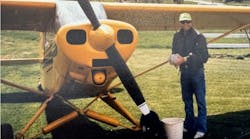Nov. 14--It's an important time in the world of aviation fuel.
Transitioning from leaded fuel to unleaded fuel used to power piston engine aircraft is part of the Federal Aviation Administration's mandates, noted Michael Kraft, senior vice president and general manager with engine-maker Lycoming.
"It's time to get the lead out," Kraft said.
A replacement is technically possible.
And consumers can benefit from reduced maintenance costs and increased equipment life, said Kraft, who was the keynote speaker at Wednesday's Wichita Aero Club luncheon at the Doubletree by Hilton Wichita Airport hotel.
The sale of aviation fuel in the U.S. is a $2 billion-a-year industry, Kraft said.
About 230,000 planes worldwide, including 167,000 in the U.S., rely on 100 low-lead aviation fuel for safe operations, the FAA said.
The goal is to lower lead emissions.
Without lead, the octane levels of aviation fuel would be too low for some engines, and the use of a lower-octane fuel could lead to engine failure, the FAA said.
As a result, lead has not been banned from aviation fuel. Over time, the market has gravitated toward one fuel: 100 low-lead gas.
Now there are questions about what will replace it.
"There's a lot consumer uncertainty," Kraft said.
The FAA's goal is for a replacement fuel to be commercially available by 2018 and that the fuel will be usable for most general aviation planes, according to information from the FAA.
To meet that goal, the FAA has asked the world's fuel producers to make submissions by July 1 for unleaded fuel candidates.
The FAA will select up to 10 producers to participate in the first phase of laboratory testing. It then will select one or two fuels for engine and aircraft testing, according to the FAA.
A mix of of unleaded 88 octane and 91 octane fuel might be used as stepping stones toward one replacement fuel, Kraft said.
The objective is to have a "drop-in" replacement so aircraft owners won't have to modify their engines.
In the European Union, unleaded 91 octane fuel is already available, Kraft said.
An unleaded fuel will be easier to distribute than the leaded gas, he said.
Today, leaded aviation gas can't be distributed through pipelines because of its lead content.
Reach Molly McMillin at 316-269-6708 or [email protected]. Follow her on Twitter: @mmcmillin.
Copyright 2013 - The Wichita Eagle


